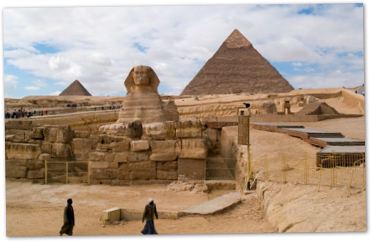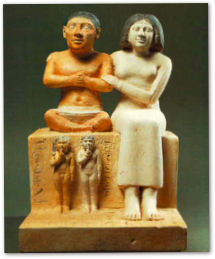





Pharaohs ruled Egypt with the help of an enormous bureaucracy – some 2,000 titles have been identified for officials of the Old Kingdom. Since he controlled every aspect of life and civilization in his realm, he needed a horde of royal officials to get stuff done. Egypt was highly centralized, but only minimally urbanized. Most Egyptians lived in small farming villages along the banks of the Nile. So administration was subdivided into small units of local government. Groups of small communities were combined into provinces called nomes (21 in all), and a royal official called a nomarch administered each nome. These administrators were the Pharaoh’s eyes and ears and hands in their own province.
To pay the nomarchs, Pharaohs gave them lands to farm. Initially, the nomarchs ruled at the king’s pleasure and lost the land when they were fired, retired or died. But, gradually, the lands and the title became the property of the nomarch and became hereditary, this from the Old Kingdom, an Egyptian aristocracy grew up, and nomarchs began to use the profits from their lands to create armies loyal to them. Eventually the nomarchs became strong enough to fight each other for dominance, and even to revolt against the Pharaoh. This happened in about 2200 B.C. and brought down centralized government for nearly 200 years (First Intermediate Period).
While there are next to no official records covering this period, there are a number of texts known as Lamentations from the early period of the subsequent Middle Kingdom that may shed some light on what happened during this period. In general the stories focus on a society where the natural order of things of both society and nature was overthrown. One particularly interesting phrase talks about times of high taxation even when the waters of the river Nile were abnormally low ("Dry is the river of Egypt, and one can cross it by foot"). Since traditionally people were taxed by the inundation level of the Nile in a given year, where people were taxed by what they should have been able to grow instead of what they actually did grow, suggesting a long period of relatively low inundations that historically often led to famine (an instance of which was recorded on the Famine Stele at Elephantine). The high taxation also implies an inherent breakdown of rule, reflecting an arbitrariness not evident during the Old Kingdom.





